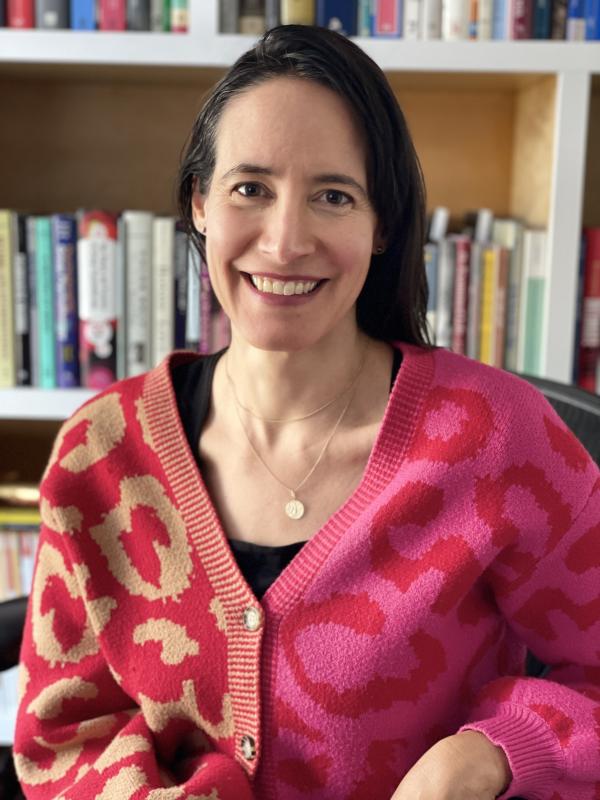
Associate Professor of Psychology Teresa Lopez-Castro
Associate Professor of Psychology Teresa López-Castro of The City College of New York’s Colin Powell School for Civic and Global Leadership is the recipient of a six-year, $7 million grant from the National Institute on Drug Abuse. The award, part of a National Institutes of Health-wide initiative, Helping End Addiction Long-Term, aims to address the trauma-related mental health needs of people with opioid use disorder.
Over the course of the six years, Lopez-Castro will collaborate with harm reduction organizations across New York State to adapt and test a post-traumatic stress disorder (PTSD) treatment for telehealth delivery at syringe services programs (SSPs). SSPs are community-based prevention programs that offer harm reduction services like access to and disposal of sterile syringes and injection equipment and treatment of infectious diseases. Many also offer low-barrier treatment of substance use disorders like same-day initiation of buprenorphine, a medication for opioid use disorder.
One of the aims of the project is to bring high-quality PTSD treatment to those for whom it is out of reach, such as the population that uses SSPs. Lopez-Castro and her collaborator, Associate Professor of Medicine Aaron Fox of the Albert Einstein College of Medicine/Montefiore Medical Center, will use the award to broaden the scope of SSP services to include an evidence-based PTSD treatment (cognitive processing therapy) tailored to the needs of highly marginalized individuals with opioid use disorders.
In this context, “highly marginalized” refers to those who, for reasons such as stigma related to injection drug use, trauma histories, or housing instability, are inadequately served by traditional health care systems, causing them to rely mainly on emergency services if or when they seek mental health care at all.
“Low barrier, harm reduction care is about meeting the individual where they are—a kind of defiant hospitality for folks who have often been let down by the medical system,” Lopez-Castro said. “Ending the opioid crisis will require equitable and sustainable collaborations with organizations like SSPs—nontraditional places of contact that provide non-judgmental, person-centered interventions.”
López-Castro’s investigative team also includes:
- Nancy Sohler, Associate Professor of epidemiology at CUNY School of Medicine;
- Aimee Campbell, Associate Professor of clinical psychiatric social work at Columbia University Irving Medical Center; and
- Debra Lee Kaysen, Chief of the Division of Public Mental Health & Population Sciences at Stanford University’s Department of Psychiatry.
“This project will improve treatment and support for people severely impacted by trauma, opioid use, and health disparities. It brings together an extraordinary team of researchers from CCNY and Albert Einstein College of Medicine around an innovative research design that has the potential to help people with opioid use disorder who are marginalized from care,” says Andrew Rich, the Richard J. Henley and Susan L. Davis Dean of CCNY’s Colin Powell School for Civic and Global Leadership. “We thank the NIH for investing in this crucial work, and I congratulate and extend my gratitude to Professor Teresa López-Castro for her leadership of this important research.”
About The City College of New York
Since 1847, The City College of New York has provided a high-quality and affordable education to generations of New Yorkers in a wide variety of disciplines. CCNY embraces its position at the forefront of social change. It is ranked #1 by the Harvard-based Opportunity Insights out of 369 selective public colleges in the United States on the overall mobility index. This measure reflects both access and outcomes, representing the likelihood that a student at CCNY can move up two or more income quintiles. Education research organization Degree Choices ranks CCNY #1 nationally among universities for economic return on investment. In addition, the Center for World University Rankings places CCNY in the top 1.8% of universities worldwide in terms of academic excellence. Labor analytics firm Emsi (now Lightcast) puts at $1.9 billion CCNY’s annual economic impact on the regional economy (5 boroughs and 5 adjacent counties) and quantifies the “for dollar” return on investment to students, taxpayers and society. At City College, more than 15,000 students pursue undergraduate and graduate degrees in eight schools and divisions, driven by significant funded research, creativity and scholarship. This year, CCNY launched its most expansive fundraising campaign, ever. The campaign, titled “Doing Remarkable Things Together” seeks to bring the College’s Foundation to more than $1 billion in total assets in support of the College mission. CCNY is as diverse, dynamic and visionary as New York City itself. View CCNY Media Kit.
Syd Steinhardt
212-650-7875
ssteinhardt1@ccny.cuny.edu